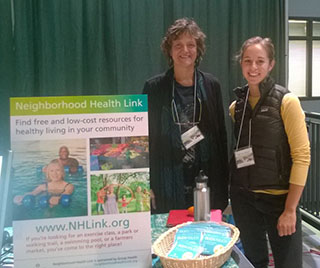May
22

Posted by Patricia Devine on May 22nd, 2015
Posted in: Funding, News from Network Members, News From NNLM PNR

Carol Cahill and Michelle Chapdelaine demonstrate Neighborhood Health Link at the October 2014 HealthFest at Seattle Center
Submitted by Carol Cahill, Research Associate, Center for Community Health and Evaluation, Group Health Research Institute
There is increasing recognition of the role that community resources play in helping people be healthy and the need for stronger linkages between those resources and primary care practices. Neighborhood Health Link (NHLink) is a web-based portal of affordable and high-quality community resources that support people in eating healthy diets, being physically active, and managing chronic conditions such as diabetes. Group Health Community Engagement sponsors NHLink as both a health promotion strategy and a clinical tool, in partnership with the Center for Community Health and Evaluation (CCHE), part of Group Health Research Institute (GHRI).
Some background: Conversations in 2010 with a number of healthcare and public health leaders pointed Group Health in the direction of strengthening clinic-community linkages as a health promotion strategy. During focus groups held in 2011 physicians at three Group Health clinics told us their patients were more likely to use a community resource like Weight Watchers if they knew the exact time and place the program was offered, but that getting information about these resources was a challenge.
To help fill this gap, we built NHLink from scratch and designed it to have both resource andgeographic granularity: Searches point to individual services and programs, such as women-only exercise classes in a particular ZIP code, rather than just to the organizations offering those programs. The database—with a customized interface—is hosted by NorthLight, which provides the platform for a number of statewide information and referral sites, including WIN211. One of NHLink’s special features is the ability to copy a permalink to search results and paste it into a patient’s medical record for later viewing at home.
Neighborhood Health Link was soft-launched in 2012 at a Group Health clinic in south King County. Providers and staff were given one-on-one training and NHLink was showcased at a number of staff meetings and huddles. Usage throughout the year remained disappointingly low, mainly because of lack of time to search for community resources during a patient visit. Updates to the NHLink database were put on hold after a Community Engagement position was eliminated.
In 2013 a GHRI/CCHE investigator received a three-year grant from the Patient Centered Outcomes Research Institute to pilot a clinic-community liaison role at two Group Health clinics (one in King County and one in Pierce County). An up-to-date and user-friendly NHLink database is a critical tool for success of this project, “Learning to Integrate Neighborhoods and Clinical Care” or LINCC. (Note to Washington readers: the LINCC project will be featured at this year’s WMLA annual meeting.) Community Resource Specialists (CRSs) were hired in summer 2014 to help patients set health goals and link them to community resources. To support this effort, CCHE received a 2014-15 NN/LM PNR Medical Library Pilot Project award to expand and update database content, train users, and engage community partners.
Over the past year, the NHLink database has been brought up-do-date and now includes programs in Pierce County. The CRSs are playing a key role in suggesting new resources and alerting us when links need correcting. LINCC project tracking reveals that the types of resources included in the NHLink database closely mirror the main reasons patients are referred to the CRS: management of chronic conditions, exercise and fitness, healthy eating, and weight control. Others in Group Health who work one-on-one with patients (e.g., social workers and nurses) have also been using NHLink.
Outreach activities have included participating in the HealthFest held concurrently with the four-day free clinic at Seattle Center last October, creating a screencast (aimed primarily at public librarians), and promotional cards that have been distributed in the community. Over several months we had discussions with a physical activity coalition about adding south King County municipal resources to NHLink along with website co-branding. This effort was eventually abandoned when it became apparent the coalition’s main interest was in promoting one-time events, which is not feasible with the NHLink platform.
A key lesson learned during the course of the Medical Library Pilot Project is that Neighborhood Health Link is most valuable in the context of a “helping relationship”—i.e., when used by those who have conversations with patients/consumers to help them set goals and/or find community resources to help them meet those goals, including librarians.
We are very grateful to have received an NN/LM PNR Health Information Services Award for 2015-16 that will allow us to reach out to potential new users to introduce NHLink and demonstrate how to search for resources and share results with patients/clients. Our target audience includes community health workers/community resource specialists, social workers, and chronic disease managers in the clinical setting, as well as advocates at community agencies and reference librarians at public library branches — let me know if you want to schedule a demo. In addition, we will continue to reach out to community partners to gauge interest in supporting NHLink going forward.
I encourage those of you who live or work in King or Pierce counties to give Neighborhood Health Link a try and let us know what you think by filling out a short survey (link is also on the NHLink home page). New features are coming soon—watch for updates on Twitter!
This project has been funded in whole or in part with Federal funds from the Department of Health and Human Services, National Institutes of Health, National Library of Medicine, under Contract No. HHS-N-276-2011-00008-C with the University of Washington.